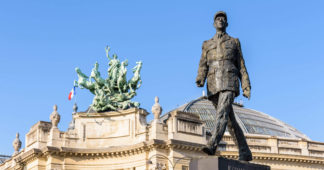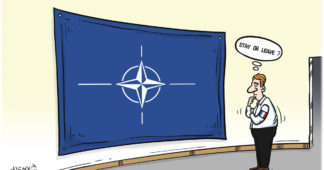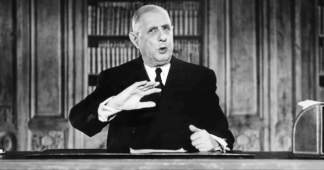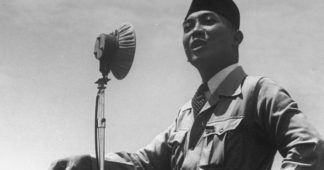June 1967, an Endless Six-Day War · From the very start of the June 1967 war, French President General Charles de Gaulle condemned Israel for having started it. This position, in contradiction with that of most political leaders, the media and public opinion earned de Gaulle many criticisms, including that of antisemitism.
A ceremony ? A “high mass” ? A theatrical performance ? The general’s press conferences had a solemn, ritual character which can only be understood in terms of the stature of the protagonist. On 27 November 1967, over a thousand French and foreign reporters gathered in the Elysée to hear the President of the Republic. His tone of voice was solemn, even lyrical at times as he set forth his perception of the reforms France had accomplished under his leadership, far-reaching changes he had brought about and declared that the Fifth Republic was destined to become “a political second nature.” Much time was devoted to foreign affairs in a world divided by the cold war and by various crises. The most dangerous threat to world peace was the war in Vietnam where already 4 000 000 American soldiers were involved. De Gaulle spoke of his trip to Québec and explained his famous “Vive le Québec libre !” (Long live free Quebec!) ; he announced his refusal to let the United Kingdom join the European Economic Community (EEC) ; he expressed his worries about the international financial system.
“We will not let you be destroyed”
Six months after the Arab-Israeli war of June 1967, he could hardly ignore the situation in the Middle East.
On 22 May, the Aqaba incident, regrettably caused by Egypt, provided an excuse for those who were spoiling for a fight. (. . .) On 2 June, the French government officially declared that in the event of hostilities it would lay the blame on whomever fired the first shots. And this was repeated unambiguously to all governments involved. This was what I myself, on 24 May, told Mr. Ebban, the Israeli foreign minister whom I met in Paris. ‘If Israel is attacked, I said in essence, we will not allow it to be destroyed, but if you attack, we will condemn your initiative. Of course, in spite of your smaller population, and considering you are better organized, much more closely knit, and much better armed than the Arabs, I have no doubt that in the event you will prevail in military terms. However, you will then find yourselves increasingly mired in difficulties, both on the ground and internationally, all the more so as a war in the Middle East cannot fail to increase deplorable tensions across the world and have unfortunate consequences for many lands. And little by little you, as the victors, will be held responsible for all the harms caused.’ As we know, the voice of France was ignored and Israel did attack and in six days achieved all of its objectives.
After having repeated his condemnation of that attack, de Gaulle reminded his listeners of the French position:
Any settlement must be based on the evacuation of all the territories conquered by force and the recognition by all the States involved of all the others. After which, through the decisions taken by the UN and with the presence and guarantee of their forces, it should probably be possible to arrive at a precise definition of borders, living conditions and security on both sides, the situation of refugees and minorities and the terms governing the freedom of navigation in the Aqaba Gulf and the Suez Canal.
None of this was new and the next day the press merely mentioned the Middle East as one item among others, devoting its main headlines to different subjects. France-Soir titled, across five columns : “General de Gaulle: gold should replace a dollar threatened by international trade”; Le Figaro: “General de Gaulle confirms his hostility to England’s entering the Common Market”; L’Aurore: “De Gaulle: No to England!” while Combat, violently anti-Gaullist, is particularly insistent: “De Gaulle, the crisis monger!” With as a subtitle: “Yesterday he exaggerated all the aspects of his foreign policy to the point of provocation.”
Extravagance and Excess
And yet, twenty-four hours later a controversy erupted, fueled at first by Tel Aviv’s reaction to one section of the conference which had gone unnoticed. De Gaulle spoke of the creation of Israel and the fear, in some quarters that
the Jews, hitherto widely dispersed and who had remained what they had always been, in other words, an elite people, sure of itself and domineering, once they were together again in the lands of their former grandeur might transform into a burning, conquering ambition the heart-moving wishes voiced over nineteen long centuries: “next year in Jerusalem.”
Hubert Beuve-Méry, editor of Le Monde (issue dated 29 November, published Tuesday the 29 in the afternoon) wrote of “whiffs of antisemitism”; Jean Daniel in Le Nouvel Observateur denounced “the ghost of Maurras” haunting de Gaulle; Jean-Jacques Servan-Schreiber wondered in his editorial for L’Express: “How far will he carry extravagance and excess?” and went on to demand nothing less than his “deposition.”1
In his Memoirs, written two years later, de Gaulle regretted having let himself be carried away: “Even at that moment, I should have kept a cool head. . . I am by nature emotive, impassioned!”Indeed the wording was clumsy, to say the least, especially his depiction of the Jews as a uniform group, a depiction which is paradoxically identical with that of Zionism. But the accusation of antisemitism? It was refuted by David Ben Gourion, founder of the State of Israel, in a letter dated 6 December 1967:
I have refrained from joining in the chorus of unjust criticisms expressed by many in France, in Israel and in other countries because they do not have, I believe, considered your remarks with the serious attention they require. (. . .) As prime minister at the time of the Fourth Republic, I know that our friendly relations with France, since the rebirth of the State of Israel were carried on even under the Fifth Republic, and I had no need to expect any friendship more faithful and sincere than yours.
Nor was de Gaulle an anti-Zionist. In that same press conference, he restated his admiration for the creation of Israel:
Which is why, quite apart from the massive support, in money, influence, and propaganda which the Israelis received from Jewish circles in America and Europe, many countries, France among them, were happy to see their country established on the territory which the world had recognized as theirs, while hoping they would exercise some restraint in their quest for a peaceful modus vivendi with their neighbors.
De Gaulle’s admiration went way back, as the Israeli ambassador in France, who visited him in Paris on 28 April 1955, attested: “De Gaulle told me he considered the creation of Israel to be a historical necessity. The Jewish people have every right to expect redress for the injustices they have suffered for so many centuries.” And he went on to express his respect for “the talents of the Jews, their clear-headed logic and energy.”2
Spare Parts for the Mirage Fighters
Actually, this controversy over the alleged antisemitism of the man who made the famous call to resistance from London in June 1940, was a pretext for attacking once again the positions set forth in June 1967. The least one can say is that these were not self-evident. During the fifties, France had been Israel’s most steadfast ally, equipping its army with sophisticated weaponry, particularly the Mirage fighter aircraft, helping it to develop military nuclear technology. France had also participated in the pathetic Suez expedition of 1956 which de Gaulle had approved at the time. It was true that since the end of the Algerian war in 1962, France had withdrawn, as the General observed in his press conference, from “certain special and very close ties” which the Fourth Republic had established with Israel. After Algeria had won its independence in 1962,
we have resumed the policies of friendship and cooperation which France had maintained for centuries with that part of the world and strongly feel today that these must be among the main foundations of our external action.
But he added: “Needless to say, we made sure the Arabs knew that for us, the existence of the State of Israel is a fait accompli and we will not stand by and let it be destroyed.”
And in fact, despite the embargo on arms sales to that region dating from June 1967, France continued to supply Tel Aviv with spare parts for its Mirage fighters.3
However, General de Gaulle’s positions ran counter to the beliefs of France’s political leaders, media and public opinion. Even some of his Gaullist friends failed to support him. Already, on 16 May 1967, a Committee for French Solidarity with Israel had been created, presided over by General Pierre Koenig and including MPs from all parties (except the CP) and reflecting a broad consensus, from Claude-Gérard Marcus (Gaullist) to Michel Poniatowski (Independent Republicans, Valéry Giscard d’Estaing’s party), including Maurice Faure (Radical) and with the support Gaston Defferre (French Section of the Workers’ International or SFIO– as the Socialist party was then called).
The dailies and weeklies went wild, none bothering to conceal their sympathies for Israel, a little David surrounded by formidable Goliaths. They warned against a second Munich, a second genocide. On 2 June one could read in Paris-Jour: “Tomorrow, the Kapos will be shouting, the dogs snarling, the tortured children screaming like animals until the nightmare ends in a hail of bullets.” “Is Israel threatened with death?” Jean Daniel asks in the Nouvel Observateur. “Yes, undoubtedly. Is this acceptable? Not at any price.”
Arabs “gorged on hashish”
In addition to the dread of a new genocide, some papers expressed a thinly veiled racism five years after Algerian independence. On 24 May, Serge Groussard, feature writer for L’Aurore wrote : Two thousand (sic!) years of Muslim negligence have turned that paradise of gold and honey (Palestine) into eroded steppes.” And elsewhere in L’Aurore, this about the Arabs “stuffed with hatred by the most fanatical propaganda campaign since Goebbels, gorged with hashish or plunged into the darkness of opium” coveting “the wonderful new riches of the Hebrew people.” And Le Figaro claimed that Arab radio stations promised the masses the orange groves of Jaffa and the women of Tel Aviv.4
In those circumstances, the emotional impact on public opinion was very real and the demonstrations in favor of Israel were immense. On 31 May 1967, 30 000 protesters gathered in front of the Israeli embassy in Paris and thousands more in the provinces: 6 000 in Marseille, 5 000 in Toulouse and Nice, 2 500 in Strasbourg and Lyon, 2 000 in Nancy, Metz and Montpellier. The Jewish community, joined now by many Jewish settlers from Algeria, was mobilized to the full. Many artists and intellectuals expressed their solidarity. Thus Serge Gainsbourg, a singer who was certainly a stranger to commitment of any kind, wrote “Le Sable d’Israel” (Sand of Israel), a song in which he claimed to be ready to die for a country where he had never set foot.
Dissident voices were rare. Even someone like Jean-Paul Sartre, deeply committed to the anti-colonial combat in Algeria and elsewhere – he had prefaced Franz Fanon’s The Wretched of the Earth published by Maspero5 — signed a statement which referred to “the desire for peace in Israel.” In a preface to the special issue of Les Temps Modernes entitled “Le conflit israélo-arabe” and which appeared at the beginnng of June, he wrote:
We are allergic to everything which in any way resembles antisemitism. Our Arab friends tell us they are not anti-semitic but anti-Israeli. But as we see it, how can they prevent those Israelis from being Jews as well?
Thus he obfuscates the whole colonial dimension of the Jewish settlements in Palestine, even though Maxime Rodinson discussed it in that same issue of Les Temps modernes under the title: “Israël, fait colonial? (Israel, colonial?)”.
Though the weekly Témoignage chrétien also refused to howl with the wolves, the only major force to criticize Israel remained the Communist Party, denounced by many as “an agent of Moscow.” On 30 May 1967, René Andrieu, editor of L’Humanité wrote: “The Israeli government, with the shadow of American imperialism looming behind it, must be held responsible for this conflict which places the peoples of the Middle East on the brink of war.” He was also one of the first to take into consideration the reality of the Palestinian situation, missing from most other analyses: “We cannot approve of the way in which the Israeli leadership drove from their country and deprived of their possessions (in 1948-1949) over a million Palestinian Arabs.” And he added : “It is the Israeli refusal to allow the refugees to return to their homes that is the chief cause of this conflict.”6
In this hysterical context, it is not surprising that on the morning of the Israeli attack of 5 June, France-Soir, one of the leading French dailies, titled across five columns “The Egyptians attack Israel” while Le Populaire, press organ of the SFIO, announced “Attacked from all sides, Israel resists victoriously”. The expression “fake news” had yet to be coined.
Against all odds, de Gaulle stuck to his guns and kept demanding a return to June 4, 1967, frontiers. Soon afterwards, France would also realize the importance of the Palestinian factor in the new crisis. Politically isolated on the domestic front, de Gaulle also distanced himself from the positions taken by France’s western allies, especially the United States. And yet as the years went by, these positions would be taken up by his successors, including those who, like Valéry Giscard d’Estaing (1974-1981) and François Mitterrand (1981-1995) had been severely critical of them. And in the nineteen eighties, these positions would come to be shared by the entire “international community”: condemnation of military land-grabbing; self-determination for the Palestinians; need for negotiating with the Palestinian Liberation Organization (PLO).
A passage from the press conference of 27 November 1967 shows just how prescient de Gaulle’s perception was:
Now it (Israel) is organizing on the territories it has taken an occupation which necessarily involves oppression, repression and expulsions, and these are met with a resistance which it in turn calls terrorism. . .
We remind our readers that publication of articles on our site does not mean that we agree with what is written. Our policy is to publish anything which we consider of interest, so as to assist our readers in forming their opinions. Sometimes we even publish articles with which we totally disagree, since we believe it is important for our readers to be informed on as wide a spectrum of views as possible.











